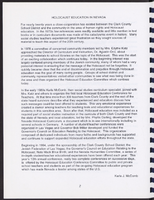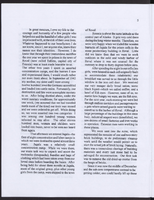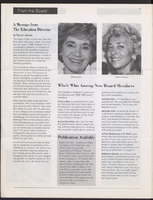Search the Special Collections and Archives Portal
Search Results

Holocaust Education Conference program, 1997
Date
Archival Collection
Description
Booklet program from the Holocaust Education Conference, 1997.
Text

Interview with Native American Forum on Nuclear Issues, April 10, 2008
Date
Archival Collection
Description
Text

Transcript of interview with Perle Garrett by Marilyn Swanson, March 2, 1975
Date
Archival Collection
Description
On March 2, 1975, Marilyn Swanson interviewed her neighbor Perle Garrett (born April 27, 1905 in Overbrook, Kansas) in her home in Boulder City, Nevada. This interview covers Boulder City during the 1930s, with special focus on the building of Boulder Dam. Mrs. Garrett relocated to Boulder City because her husband Theodore Garrett was one of the workers at the dam. She also discusses Six Companies houses, family life, the weather, churches in Las Vegas and recreational activities for local children. Her husband is also present during the interview.
Text

Meeting minutes for Consolidated Student Senate, University of Nevada, Las Vegas, October 09, 2000
Date
Archival Collection
Description
Text

Sachiko Young oral history interview: transcript
Date
Archival Collection
Description
Oral history interview with Sachiko Young conducted by Mikaela Nettlow on December 5, 2021 for Reflections: The Las Vegas Asian American and Pacific Islander Oral History Project. Sachiko shares her upbringing in Fukoka, Japan and how she and her family moved frequently as a child. She talks about meeting her husband, an American military man, while visiting family in Tokyo. Sachiko discusses their marriage and birth of their child, their move to San Jose, California, and their travels back and forth from Japan before settling in Las Vegas, Nevada. She shares stories of visiting casinos with friends, working in hotel coffee shops, and what life was like for her and her family. Sachiko also talks of how she and her husband both faced racial prejudice from their families and the difficulties of learning English as a second language.
Text
Dorothy Eisenberg Papers
Identifier
Abstract
The Dorothy Eisenberg Papers (early 1900s-2009, bulk 1970-2000) are comprised of organizational records, photographs, newspaper clippings, and scrapbooks reflecting her activism and volunteer work related to education, the Bullfrog County Commission, Las Vegas Clark County consolidation, League of Women Voters (LWV), Las Vegas Jewish Federation, Equal Rights Amendment (ERA), and Silver State Political Action Committee.
Archival Collection

Patricia Vazquez interview, November 14, 2018, June 14, 2019: transcript
Date
Archival Collection
Description
Session 1: Interviewed by Marcela Rodriguez-Campo. Barbara Tabach also participates in the questioning. Session 2: Interviewed by Rodrigo Vazquez. Monserrath Hernandez also participates in the questioning. Patricia Vazquez was born and raised in Las Vegas, NV and shares her experiences growing up in the Valley as a Queer Latina. At a young age, she remembers traveling back and forth between Mexico and the U.S. to visit family. When she started school she shares how her home language, Spanish, became her family's "secret language" as she began to learn English. During elementary school Patricia was tracked into the special education program, and remove from the mainstream classroom. She would find her love for learning in books and libraries as she taught herself how to read in English. Despite being tracked into less advanced courses, Patricia would end up taking AP/ Honors courses in high school after forging her favorite teachers signature, which changed her educational trajectory. After coming out to her family, Patricia went nearly a decade distanced from her mother and continued her college education at Arizona State University. There, she would complete a bachelors in painting and a masters in comparative literature. Her work with the Chicano Studies program at ASU helped her develop her Chicana identity and begin her involvement in social activism. In Las Vegas, she worked to fight for marriage equality and LGBTQ rights with the American Civil Liberties Union , and later with the Progressive Leadership Alliance of Nevada. She also conducted several lectures for the Latino Youth Leadership Conference on sexuality, gender, and homophobia for over a decade. She has served as an English Professor at the College of Southern Nevada for the last 20 years and is an avid hiker, traveler, and painter.
Text

Transcript of interview with Yorgo Kagafas by Claytee White, January 14, 2010
Date
Archival Collection
Description
Yorgo Kagafas is a self-described "urban guy." He became an Urban Planner for the City of Las Vegas in 1999. A farm boy from Ohio, he was educated at The Ohio State University, served in the US Navy and earned a M.A. in Environmental Planning from Arizona State University. He came to Las Vegas with a successful grassroots experience from living in a historic Phoenix neighborhood. His unique background complemented his new job which was to implement the Neighborhood Planning Process, a proactive system for Las Vegas communities to express their neighborhood desires prior to a developer coming in with their own agenda. In this interview he explains the criteria that must be met in this process. By coincidence, Yorgo moved into the John S. Park Neighborhood. He was attracted to its central location, intact residential neighborhood, and homes with character at affordable prices. While walking his dog one day, he met neighborhood leader, Bob Bellis, and became aware of neighborhood activism that could use his expertise. Yorgo points out that the good-old-boy mentality that still existed in Las Vegas was a potential obstacle. However he, Bob, and others were able to rally the homeowners and became a textbook example of how the Neighborhood Planning Process should work. He helped them identify their main issues: 1) Mary Dutton Park rehabilitation; 2) code enforcement of property maintenance; 3) attaining historic designation; 4) halting commercial encroachment. That was the first battle, according to Yorgo. With that done, they could next devise and implement a plan, which he describes. The process officially began March 14 2000. In June 2001, the Las Vegas City Council approved the final document.
Text


